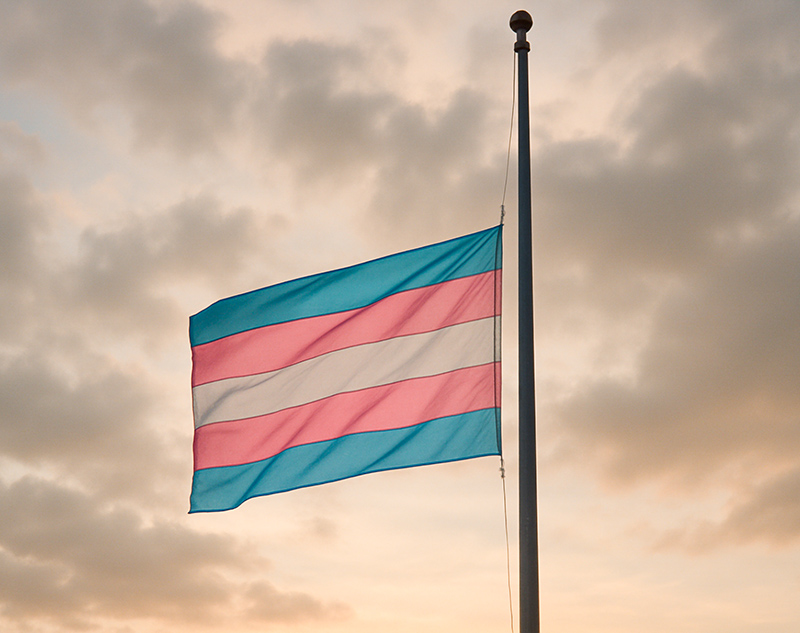Federal court rules Wisconsin must provide health insurance coverage for transgender state employees
Decision bolsters recent move by state insurance board to allow for coverage of gender confirmation surgeries
By John Riley on September 19, 2018 @JRileyMW

A federal court has found that denying transgender state employees health insurance coverage for transition-related medical care is unconstitutional and violates federal nondiscrimination law.
The American Civil Liberties Union, ACLU of Wisconsin, and volunteer attorneys from the law firm Hawks Quindel sued the state of Wisconsin on behalf of two employees at the University of Wisconsin-Madison, who complained after they were denied coverage for transition-related surgical costs, even though their doctors had deemed the surgery “medically necessary” for the purposes of treating their gender dysphoria.
One of the plaintiffs, graduate student Alina Boyden, was forced to forego gender confirmation surgery, while the second, cancer researcher Shannon Andrews, was forced to pay $21,000 in out-of-pocket expenses when she went forward with surgery. Both women claimed that the denial of coverage violated their rights under the Equal Protection Clause of the Fourteenth Amendment, and under several other federal laws prohibiting discrimination based on sex.
On Wednesday, U.S. District Judge William Conley, of the Western District of Wisconsin ruled in favor of the plaintiffs, saying that some of the state’s arguments appear “unhinged from reality.”
“As an initial matter, removing the [transgender] Exclusion does not compel surgery, nor any other treatment for gender dysphoria,” Conley wrote. “Again … a portion of transgender individuals do not suffer from gender dysphoria; and for some portion of those individuals who do, gender confirmation surgery and/or hormone therapy will not be a recommended course of treatment.
“[T]he Exclusion implicates sex stereotyping by limiting the availability of medical transitioning, if not rendering it economically infeasible, thus requiring transgender individuals to maintain the physical characteristics of their natal sex,” he continued.
“In other words, the Exclusion entrenches the belief that transgender individuals must preserve the genitalia and other physical attributes of their natal sex over not just personal preference, but specific medical and psychological recommendations to the contrary.
“In this way, defendants’ assertion that the Exclusion does not restrict transgender individuals from living their gender identity is entirely disingenuous, at least for some portion of that population who will suffer from profound and debilitating gender dysphoria without the necessary medical transition.
“Whether because of differential treatment based on natal sex, or because of a form of sex stereotyping where an individual is required effectively to maintain his or her natal sex characteristics, the Exclusion on its face treats transgender individuals differently on the basis of sex, thus triggering the protections of Title VII and the ACA’s antidiscrimination provision,” Conley concluded.
The plaintiffs and their lawyers celebrated the court’s decision.
“I’m pleased the court recognized that denying coverage for my medical care was sex discrimination. I, personally, was lucky to be in a position to have retirement funds and savings I could take out to fund my medical care, but had I been less fortunate I would not be alive today,” Andrews said in a statement. “Today, I feel vindicated the court recognized what the state did was wrong. I hope that this will be a powerful signal that trans people are not fair game for discrimination and that our lives and health are not a political football.”
Last month, Wisconsin’s Group Insurance Board approved health insurance coverage for gender confirmation surgery for state employees starting on Jan. 1, 2019. In 2016, the board had approved coverage for transition-related surgeries starting in January 2017, but voted to reinstate the exclusion in December, just before the policy went into effect. Wednesday’s decision goes further, declaring the exclusion unconstitutional and circumventing any politically-motivated attempts by the insurance board to reverse or backtrack from its current stance.
The state of Wisconsin also recently lost another case involving coverage for transition-related care in July. In that case, a federal judge ruled that the state cannot bar Medicaid from covering gender confirmation surgery for low-income transgender residents.
“As the court found, depriving transgender people of access to transition-related care is sex discrimination,” Larry Dupuis, the legal director for the ACLU of Wisconsin, said in a statement. “We will continue our work until all transgender people can get the medical care they need, just like other people can.”
More from Metro Weekly:
Florida Man Charged With Attempted Murder for Shooting Neighbor
Victim's friends say the alleged shooter had previously harassed him by smearing feces on his house and posting signs with anti-LGBTQ slurs.
By John Riley on December 8, 2025 @JRileyMW
Tyler Getchell of Jacksonville, Florida, has been charged with attempted murder after allegedly shooting and partially paralyzing his neighbor, Kyle McFarlane, during an argument over what Getchell believed was trespassing.
McFarlane told police he was gathering discarded furniture for a bonfire on November 22 when Getchell and his girlfriend came outside and yelled at him to get off their property, First Coast News reported.
According to the police report, video footage shows McFarlane standing on a property easement -- not on his neighbors' land -- just before the shooting.
Dutch Court Rejects U.S. Trans Woman’s Asylum Bid
Dutch authorities say Veronica Clifford-Carlos failed to prove she faces a "legitimate risk of persecution" or threat of physical harm in the United States.
By John Riley on November 26, 2025 @JRileyMW
A Dutch court has upheld a ruling rejecting a U.S. transgender woman's bid for asylum, finding she does not face a substantial enough threat of persecution in her home country.
Veronica Clifford-Carlos, a 28-year-old visual artist from California, said she once believed she’d build a life in the United States, but felt compelled to flee after receiving death threats over her gender identity.
Clifford-Carlos left the United States -- leaving behind friends and her dog -- and flew to the Netherlands with her father. Upon arrival, she applied for asylum, telling authorities about the abuse she endured in the United States, particularly after President Donald Trump’s re-election last fall.
TDOR Report Memorializes 58 Trans People Who Died in 2025
Advocates for Trans Equality’s 2025 "Remembrance Report" honors 58 trans and nonbinary people who died over the past year.
By John Riley on November 19, 2025 @JRileyMW
Ahead of Transgender Day of Remembrance on Thursday, November 20, Advocates for Trans Equality, a national organization, released a report honoring the 58 known transgender people who have died in the United States over the past year.
First held in 1999, Transgender Day of Remembrance was initially intended to mourn those transgender people lost to violence. The first organizers memorialized Rita Hester, killed in November 1998 in Boston, and Chanelle Pickett, murdered in November 1995 in Watertown, Mass.
Since that first memorial service, cities and regions throughout the world have adopted November 20 as a day to commemorate transgender and nonbinary individuals who have died -- whether due to murder, suicide, or natural causes.
Support Metro Weekly’s Journalism
These are challenging times for news organizations. And yet it’s crucial we stay active and provide vital resources and information to both our local readers and the world. So won’t you please take a moment and consider supporting Metro Weekly with a membership? For as little as $5 a month, you can help ensure Metro Weekly magazine and MetroWeekly.com remain free, viable resources as we provide the best, most diverse, culturally-resonant LGBTQ coverage in both the D.C. region and around the world. Memberships come with exclusive perks and discounts, your own personal digital delivery of each week’s magazine (and an archive), access to our Member's Lounge when it launches this fall, and exclusive members-only items like Metro Weekly Membership Mugs and Tote Bags! Check out all our membership levels here and please join us today!
The Magazine
-
Most Popular
 Terry Sweeney Slams Chevy Chase Over Alleged AIDS Joke
Terry Sweeney Slams Chevy Chase Over Alleged AIDS Joke  Jonathan Bailey Is 2025’s Highest-Grossing Actor
Jonathan Bailey Is 2025’s Highest-Grossing Actor  Conservatives Rage Over Lesbian Pick for FDNY Commissioner
Conservatives Rage Over Lesbian Pick for FDNY Commissioner  Seattle Children’s Investigated by HHS Over Trans Youth Care
Seattle Children’s Investigated by HHS Over Trans Youth Care  Most Sniffies Users Aren’t Gay, New Data Shows
Most Sniffies Users Aren’t Gay, New Data Shows  Adult Film Star Lane V Rogers, 31, Dies in Motorcycle Accident
Adult Film Star Lane V Rogers, 31, Dies in Motorcycle Accident  Netflix’s Stranger Things Sparks Anger Over Will’s Coming Out
Netflix’s Stranger Things Sparks Anger Over Will’s Coming Out  Departing NYC Mayor Eric Adams Announces $2 Million for Trans Groups
Departing NYC Mayor Eric Adams Announces $2 Million for Trans Groups  Injectable PrEP Does Not Interfere With Hormone Therapy
Injectable PrEP Does Not Interfere With Hormone Therapy  RuPaul’s Drag Race Season 18: Meet the New Queens
RuPaul’s Drag Race Season 18: Meet the New Queens
 UK to Allow Same-Sex Ice Dance Pairs at National Events
UK to Allow Same-Sex Ice Dance Pairs at National Events  Terry Sweeney Slams Chevy Chase Over Alleged AIDS Joke
Terry Sweeney Slams Chevy Chase Over Alleged AIDS Joke  Departing NYC Mayor Eric Adams Announces $2 Million for Trans Groups
Departing NYC Mayor Eric Adams Announces $2 Million for Trans Groups  Netflix’s Stranger Things Sparks Anger Over Will’s Coming Out
Netflix’s Stranger Things Sparks Anger Over Will’s Coming Out  Seattle Children’s Investigated by HHS Over Trans Youth Care
Seattle Children’s Investigated by HHS Over Trans Youth Care  Knesset Speaker’s Civil Marriage Vote Sparks Ultra-Orthodox Fury
Knesset Speaker’s Civil Marriage Vote Sparks Ultra-Orthodox Fury  Conservatives Rage Over Lesbian Pick for FDNY Commissioner
Conservatives Rage Over Lesbian Pick for FDNY Commissioner  Injectable PrEP Does Not Interfere With Hormone Therapy
Injectable PrEP Does Not Interfere With Hormone Therapy  University of Oklahoma Fires Transgender TA Who Failed Student
University of Oklahoma Fires Transgender TA Who Failed Student  Jonathan Bailey Is 2025’s Highest-Grossing Actor
Jonathan Bailey Is 2025’s Highest-Grossing Actor
Scene
Metro Weekly
Washington's LGBTQ Magazine
P.O. Box 11559
Washington, DC 20008 (202) 527-9624
About Us pageFollow Us:
· Facebook
· Twitter
· Flipboard
· YouTube
· Instagram
· RSS News | RSS SceneArchives
Copyright ©2025 Jansi LLC.













You must be logged in to post a comment.